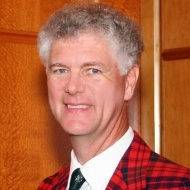Steve Forrest became an associate with Arthur Hills / Steve Forrest and Associates after earning his bachelor of landscape architecture degree from Virginia Tech in 1979. He became a principal in the firm in October 1999. He is immediate past-president of the American Society of Golf Course Architects, and created the concept for this book. In recent years, Steve has been active with the expansion of the Arthur Hills portfolio in Europe. He has completed four new courses in Sweden and is currently working on projects in Norway, Russia, and Poland. Projects in North America take him from Maine to southern California with an occasional side trip to the Caribbean. Some of Forrest’s more notable courses are The Links at Lighthouse Sound, in Ocean City, Maryland; Journey at Pechanga in Temecula, California; Sand Golf Club, in Jonkoping, Sweden; Forest Hills Resort and Golf Club outside Moscow, Russia; and White Clay Creek Country Club, in Wilmington, Delaware.
The day was June 5th, 2006—a Monday. I was on a business development trip thro ugh Europe and had just spent a seemingly successful weekend trying to close our first project in Germany. One potential client had gotten us stuck in the mud near Munich on Friday, but the lunch that followed in the clothing optional section of a thermal spa quickly took my mind off the earlier mishap.
ugh Europe and had just spent a seemingly successful weekend trying to close our first project in Germany. One potential client had gotten us stuck in the mud near Munich on Friday, but the lunch that followed in the clothing optional section of a thermal spa quickly took my mind off the earlier mishap.
Topping out at 122 miles-per-hour on the Autobahn and a tour of Heidelberg with another prospect on Saturday night had been memorable, too. Our timing was perfect – we caught the light show and fireworks that are displayed only four times a year at the famous castle there.
My next solid appointment was on Tuesday in Bratislava, Slovakia. I was to present a plan for a world class resort course on a small island called Salt Cay in the Turks and Caicos Islands in the Caribbean. It was the best golf course site that our company had in the 28 years that I’d been with Arthur Hills—superb ocean views from the entire course and ten holes directly on the water. We didn’t officially have the project under contract yet, so it was very important that the presentation to the potential client went well.
Since that important appointment wasn’t until Tuesday, I figured I would try to make Monday somewhat productive by agreeing to check out a potential project site about 45 minutes north of Budapest in Hungary. This was one of those speculative projects where I didn’t know much about the client, his site, or his country. I just took a chance that it may eventually turn into something.
After spending Sunday night at the Steigenberger Hotel at the airport in Frankfort, I caught a Lufthansa flight that landed in Budapest before noon. The good news was that while I was waiting to get off the plane, I received a call from Gyorgi, the man who was to meet me at the airport.
“I will be on the left after you clear customs,” Gyorgi told me.
The international arrivals doors opened automatically and I begin surveying the faces of the people standing to the left. No sign of Gyorgi. Maybe he meant outside at the curb? Not there, either. Maybe he meant his left? So I went back inside the terminal and looked to the other left. No Gyorgi. I went back outside and tried to call Gyorgi on my cell phone. No answer. I left a message and began looking at faces in the cars stopped along the curb. No Gyorgi. My phone rang, and I answered it to learn that Gyorgi had been waiting on the left alright—sitting in a café, having a cup of coffee!
“Hi, Gyorgi. Steve Forrest. I’m pleased to meet you,” I said, extending my hand and sitting at his table.
“We will go look at the site and then I will bring you back to the airport,” Gyorgi explained, finishing his coffee.
“I would like to travel on to Bratislava by train this afternoon, Gyorgi.”
“No problem,” he said. “There is a four o’clock p.m. departure which runs along the Danube to Bratislava.”
He drove me first to the train station to buy the ticket. The train fare was 7,825 Hungarian Forint. Before I left America, I had printed out a currency exchange chart for the various countries that I knew I’d be visiting, but I hadn’t committed it to memory and didn’t bother to pull it out before purchasing the ticket. I thought perhaps Gyorgi might offer to help with the cost of my ticket since I had come this far with absolutely no expense to him other than the gas to drive us around, but he remained silent. After a proper intentional delay, I could no longer stand the awkward silence. I gave the ticket agent my credit card and hoped the fare wasn’t outrageously high.
We then drove on out into the country on a slippery, winding, two-lane road up a mountain. Gyorgi began to look for the farm road that would lead down to the site. He slowed down at one turnoff but and then kept going. At the next road on the left, he turned in despite the fact there was a pile of dirt that had been placed in the center of the two-track road to discourage people from driving down it. Our compact car had just enough momentum to carry us over the hump, but at the bottom of the hump was a mud hole formed by recent rain. It all happened so fast, but I knew we were hopelessly stuck because he had absolutely no momentum or traction with which to reverse back over the hump, and if we went any further forward, the mud hole would’ve swallowed us up.
“This is the wrong road!” Gyorgi said.
He began to try to reach someone on his cell phone to come pull us out of the mud. I got out and begin to assess the damage and look for anything with which to create some traction. I realized it was hopeless, and then heard Gyorgi shout to me that he’s had no luck telephoning anyone.
Several punk-looking teenagers came walking up the country lane but walked right past us without even an exchange of looks or bit of conversation. I thought it was eerie when Gyorgi didn’t even try to solicit their help to push us out.
“I reached someone,” said Gyorgi, fumbling with his phone. “The correct site entrance road is just down the hill. While we are waiting for someone to come pull our car out, you should go ahead and see the site. I will walk down the hill with you and then come back to meet the person who is going to tow us out.”
I had been traveling for several days in Europe at this point and had a large suitcase, a carry-on case, my briefcase, and a drawing tube containing a plan I was to present in Bratislava the next morning, all of which was locked out of sight in the car. I took my Blackberry and my camera with me on the walk down the hill with Gyorgi.
About halfway down the hill, five minutes into the walk, Gyorgi spoke.
“I don’t feel comfortable leaving the car unattended,” he said. “I will go back and stay with the car.”
I continued down to the site and took some pictures of a broad valley with a beautiful stream flowing through it – a nice site. After 15 minutes, I finished taking pictures and headed back up the hill. Somewhere along the walk, my mobile phone rang. As soon as I heard Gyorgi’s voice, I knew what he was going to say.
“Oh, Mr. Forrest, I have some terrible news! Someone smashed the window on the car and took everything.”
I already had the vision of the open hatchback in my head before I actually reached the car and saw it. It was not a pretty sight. My briefcase was missing. It contained my laptop computer, travel documents, passport, plane tickets, and the train ticket I’d purchased earlier in the day. Also gone were my domestic cell phone, chargers, glasses, calculator, and various files and papers for my trip. The thieves also nabbed my big suitcase with all my clothes. The only things they missed were my street shoes and the tube containing the project drawing.
Gyorgi called the police,and when they arrived, it took ninety minutes to sort everything out. Afterwards, though, I was unable to go on to Bratislava because I had no passport. My deal with the great site in the Caribbean was in jeopardy because I would not make the meeting the next day. Two days later, I was supposed be back in the States to pick up my son from Ohio State University, but I figured I might not even have a new passport by then.
‘Mr. Forrest, today is my sixtieth birthday and I have an appointment in one hour. Your golf course design fee is much too expensive for us. But I will take you to any hotel you wish on the way to my appointment,’ said Gyorgi. ‘The Kempinski downtown if very nice.’
The mishap filled visit had been for naught, but at the rate it was going, I could not afford Gyorgi much longer anyway.
‘That’s fine,’ I agreed.
Almost on cue, a very attractive, a very attractive woman in a low-cut blouse pulled up in a fancy car and gave ol’ Gyorgi boy a passionate kiss and wished him ‘Happy Birthday.’ She drove us to the Kempinski in her sexy car.
Gyorgi walked me to the check-in desk and confirmed they had a room for me.
At that instant, my Blackberry rang.
“Steve, it’s Pam.”
Pam is the manager from my office in Toledo.
“A police officer just called and said that they found your passport and suitcase, Steve. Quick, write down this phone number.”
I gave the phone number to the front desk attendant, who called it and got directions. The hotel provided a driver who took me back out into the country. Forty-five minutes later, we pulled up to a farmhouse with a gate and a concrete walk on the side that led up to a small, covered shelter with a picnic table under it. There, stacked on the picnic table, was my large suitcase and the carry-on case. In broken English, with some translation help from the driver, I learned they’d found everything up the street in a ditch. My passport, plane ticket, train ticket, and all my frequent flyer cards were still in the travel document case in the carry on bag. Amazing! I thanked the finders profusely with a bunch of head nodding and we headed back to central Budapest.
On the ride back, I took inventory, and though my briefcase was not recovered, the thieves dumped most its contents into the carry-on. The important thing missing was my laptop, which was three years old and at 95% capacity on the hard drive anyway. Good luck with that English version of Windows!
I called Pam back at the office and she restored all of my airline reservations for Wednesday so I left an e-mail for the Bratislava clients to tell them our important meeting was back on for 9 a.m. Tuesday.
Once back at the hotel, the desk clerk checked train schedules for me and there was a 7:45 PM departure to Bratislava, but from a different station than my original ticket. There was a 165 Forint surcharge for changing stations. I warily gave the train station attendant my credit card, and she explained that, in U.S. dollars, the original ticket was only $38.20 and the surcharge was $0.81! What a relief!
I got the job from the client in Bratislava the next day, and it was the best site we’ve have ever worked with. Being on that small island in the Caribbean felt as if it was a million miles from Gyorgi and Budapest!

